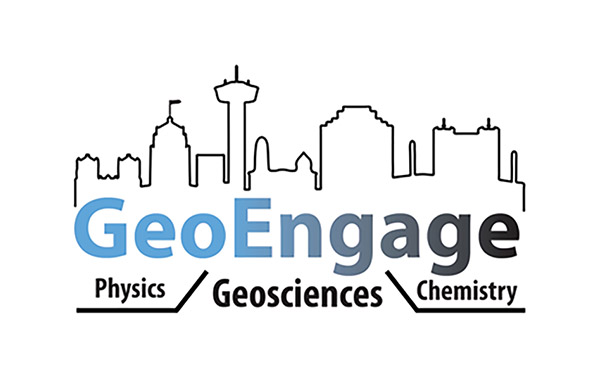Welcome to GeoEngage!
The GeoEngage program was a joint venture between faculty at The University of Texas at San Antonio, Northwest Vista College (NVC), and Palo Alto College (PAC) which was funded by the National Science Foundation. In the Fall of 2022, the Department of Earth and Planetary Sciences and Northwest Vista College in San Antonio commenced a three-year program to broaden the recruitment of undergraduate students for the geoscience major. Palo Alto College joined the effort in the Fall of 2023.
Key components of the program included in-person and online intervention modules for introductory courses and opportunities for extracurricular service-learning projects that benefited the San Antonio community. The course modules developed for introductory STEM courses, specifically chemistry, geosciences, and physics, aimed to raise awareness of and interest in the geosciences as a subject, while the service-learning projects were intended to help retain students in the geoscience major or minor. Undergraduate students benefited through improved academic preparedness, career awareness, and appreciation for how geosciences contribute to society by participating in program activities.
Despite concerted effort over the last two decades, the size and diversity of the geoscience workforce has not significantly changed to meet the projected demand for geoscientists, which has major consequences for the sustainability of natural resources and overall environmental quality that supports a strong economy and ensures the health and welfare of all United States residents. This project aimed to address this shortfall using an innovative curriculum program to recruit and retain more undergraduate students; it promoted interest in geoscience within NVC and PAC, two two-year institutions where geoscience courses are limited, and facilitated transfer pathways from NVC and PAC to The University of Texas at San Antonio, a four-year institution. All partnering colleges are Hispanic-Serving Institutions (HSIs). The new insights gained from the program form a model of best practices that can be adapted and implemented at other universities to grow a larger, more diverse geoscience workforce.
Approach
This project aimed to increase and broaden participation and enhance retention in geoscience by implementing and testing the effectiveness of a three-stage early intervention strategy within the undergraduate degree pipeline.
For the first stage, four modules were tested for effectiveness as a recruitment strategy in introductory geoscience, chemistry, and physics courses, targeting specific motivations and barriers to increase and diversify the pool of geoscience majors and minors. Stages 2 and 3 leveraged a two-level sequence of team-based service-learning projects used to deepen geoscience knowledge, build project-based experience, and grow independence and responsibility in participants to increase disciplinary interest and motivation and develop geoscience identity and community. Participants were supported by multi-level mentoring, advising, and stipends; the dissemination plan involves the publication of program modules on learning management system and YouTube.
The project design permitted a critical test of a recruitment approach that targets a wider pool of potential majors and the key elements of service-learning projects that promote learning and retention. The new knowledge identified from formative and summative program assessments is widely transferrable because it focuses on introductory courses that are generally offered at many institutions and experiential learning projects that can flourish independently from formal coursework. The best practices that result are widely disseminated for broader adaptation in diverse institutional settings to help increase the number and diversity of students earning bachelor's degrees in geoscience.
Disclaimer

This material is based upon work supported by the National Science Foundation under Grant Number 2119446. Any opinions, findings, and conclusions or recommendations expressed in this material are those of the author(s) and do not necessarily reflect the views of the National Science Foundation.


